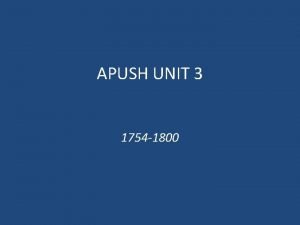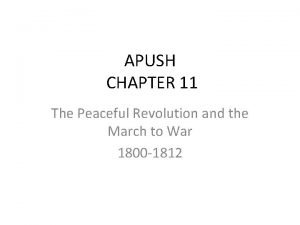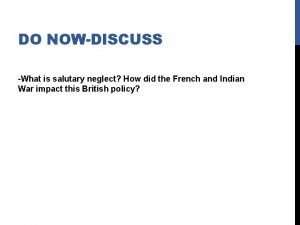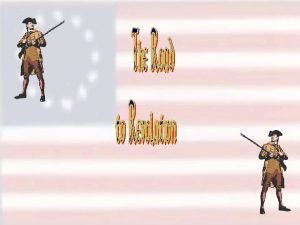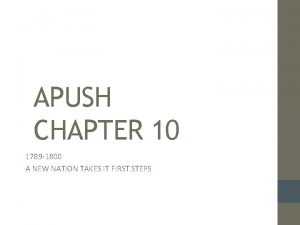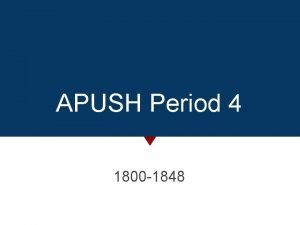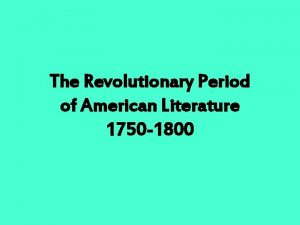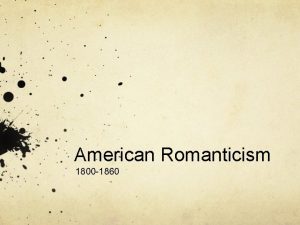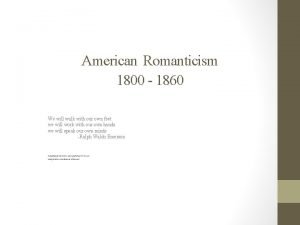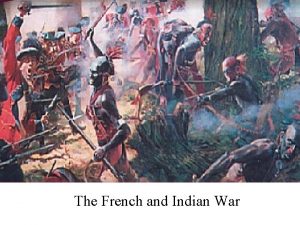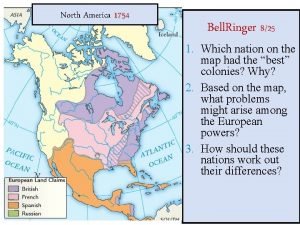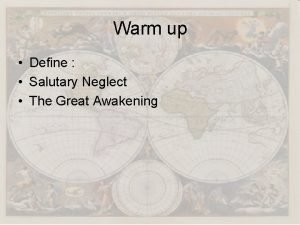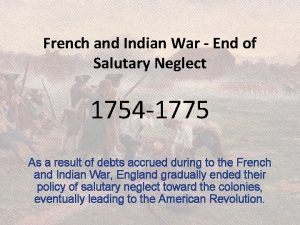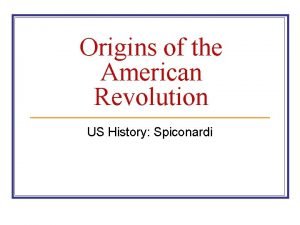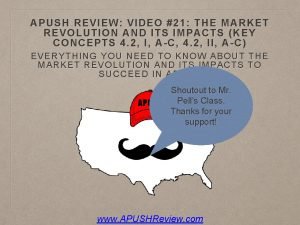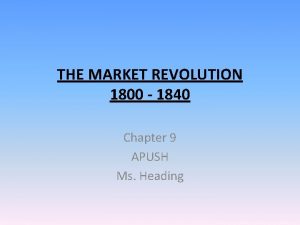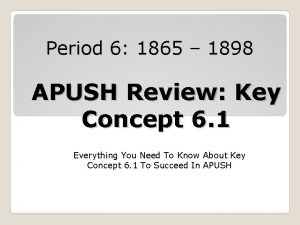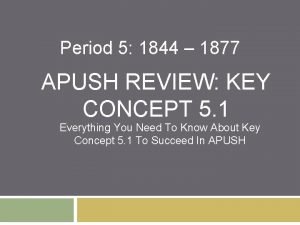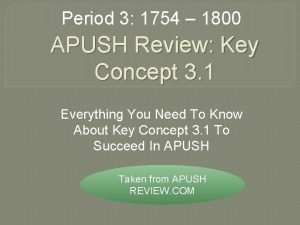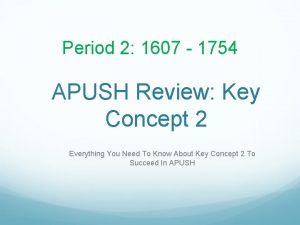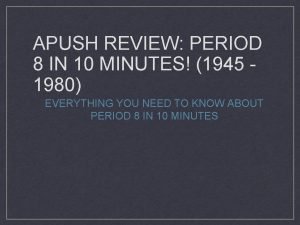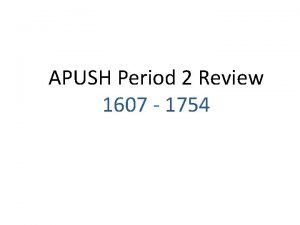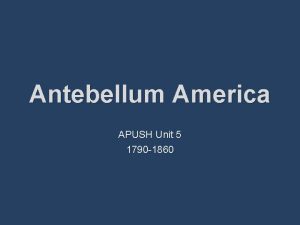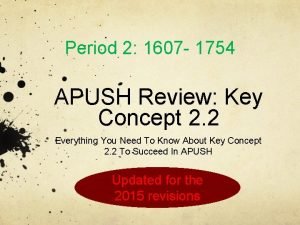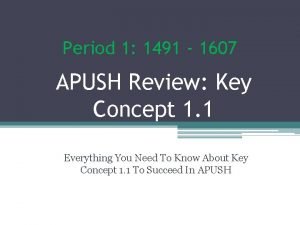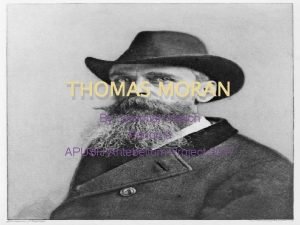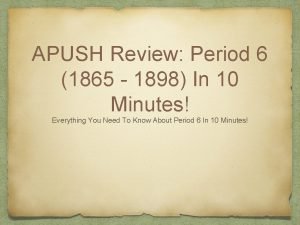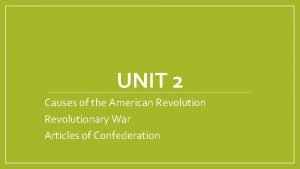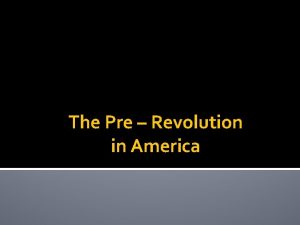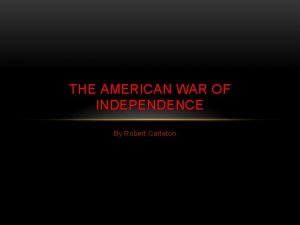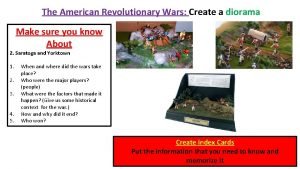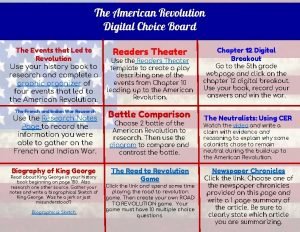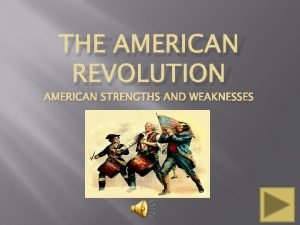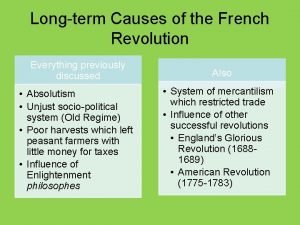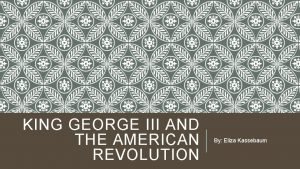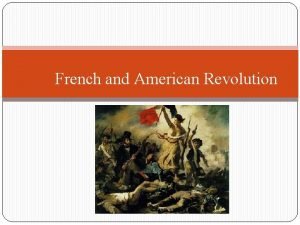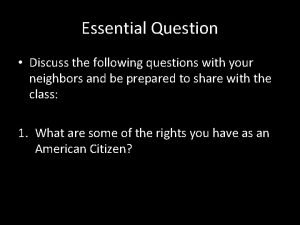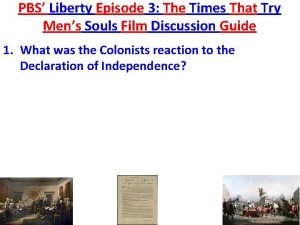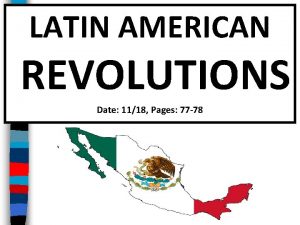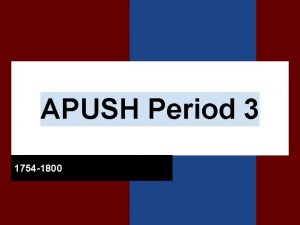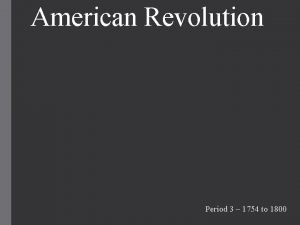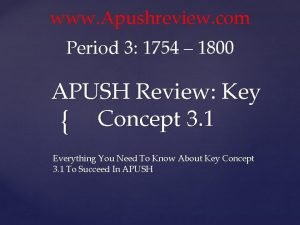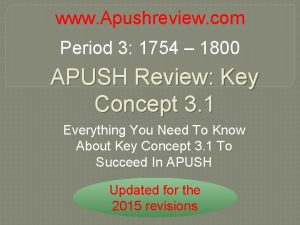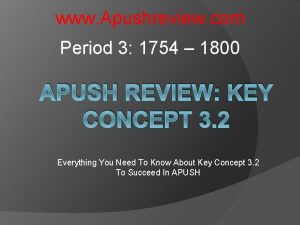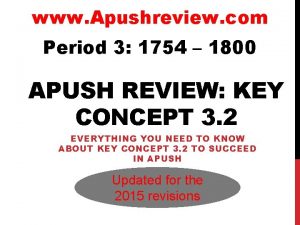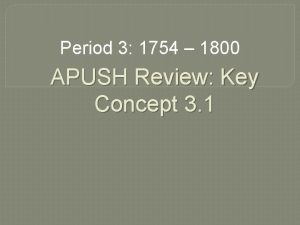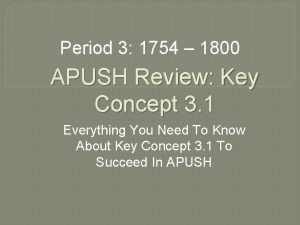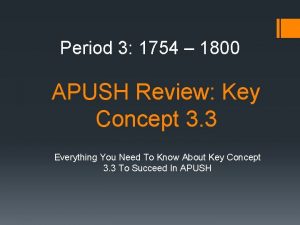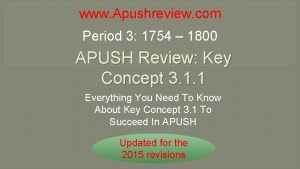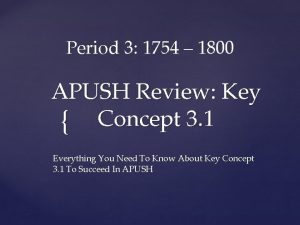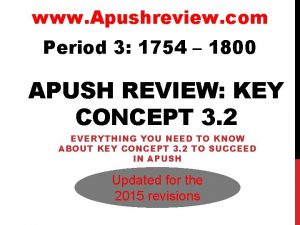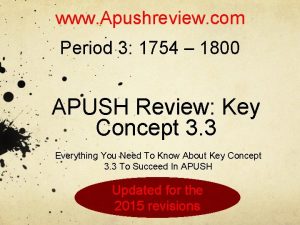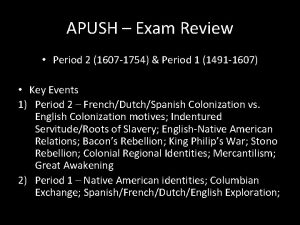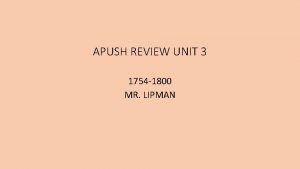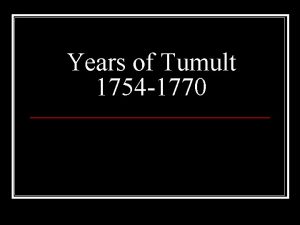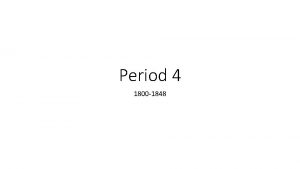AMERICAN REVOLUTION Period 3 1754 1800 APUSH SALUTARY





















































- Slides: 53

AMERICAN REVOLUTION Period 3 1754 -1800 APUSH

SALUTARY NEGLECT/BENIGN (B 9) NEGLECT ►British absenteeism Distance between England America Political turmoil and relative peace ►Colonies virtually on their own Developed unique economies based on region Self-government Still considered themselves as British subjects entitled to same rights and privileges

BRITAIN EXERTS MORE CONTROL ►Navigation Acts strengthened Increased concept of mercantilism Vice-admiralty courts ►Merchant courts, juryless, “corrupt judges” Board of Trade ►Develop mercantilist policies over


Boston Massacre March 5, 1770 BOSTON MASSACRE IS TO _____ AS ________ IS TO ______ Relating factor: __________ Several colonists threw rocks and snowballs at British troops in Boston. The soldiers fired, leaving five colonists dead. The victims were seen as martyrs. The events of the incident were exaggerated for propaganda

FRENCH AND INDIAN WAR (1754 -1763) England vs. France Most Natives allied with French Increased British troop activity in America Colonists contributed to effort Albany Plan of Union (1754) Benjamin Franklin Results/Consequences British victory Acquisition of French Canada and land east of Mississippi War debt 72 M pounds (1755) 129 M pounds (1764) British believed more control necessary Colonial pride


PROCLAMATION OF 1763 Pontiac’s Rebellion (1763) Extensive Native alliance to deter colonists Purpose Avoid conflicts Colonial Reaction

WHO SAID THIS? It is important for us, my brothers, that we exterminate from our lands this nation which seeks only to destroy us. You see as well as I do that we can no longer supply our needs, as we have done from our brothers, the French. The English sell us goods twice as dear as the French do, and their goods do not last. Scarcely have we bought a blanket or something else to cover ourselves with before we must think of getting another; and when we wish to set out for our winter camp they do not want to give us any credit as our brothers the French do.

When I go to see the English commander and say to him that some of our comrades are dead, instead of bewailing their death, as our French brothers do, he laughs at me and at you. If I ask for anything for our sick, he refuses with the reply that he has no use for us. From all this you can well see that they are seeking our ruin. Therefore, my brothers, we must all swear their destruction and wait no longer. Nothing prevents us: They are. ARE few in THE numbers, and. TREATED we can HOW ___ accomplish BY THE it. FRENCH? BY

YOU THINK PONTIAC IS PLEASED WITH THE OUTCOME OF THE FRENCH AND INDIAN WAR? WHY? PROVE WITH All the nations who are our brothers attack EVIDENCE them – why should we not strike too? Are we not men like them? Have I now shown you the wampum belts [beaded belts symbolizing an agreement or treaty] which I received from our great father, the Frenchman [King Louis XV]? He tells us to strike them. Why do we not listen to his words? What do we fear? It is time. Chief Pontiac of the Ottawa tribe addressing a gathering of


PRELIMINARY REBELLIONS Paxton Boys (1764) Pennsylvania Scots -Irish upset with Quaker government and toleration of natives Massacred many Regulators (1764 -1771) NC frontiersmen upset with eastern corruption

►Philosophes THE ENLIGHTENMENT ►The Age of REASON ►Laws of Nature applied to society ►Deism “the clockmaker” Absent of human affairs ►Inspired by John Locke Second Treatise on ►Voltaire Individual liberties Freedom of expression ►Montesquieu Separation of powers ►Rousseau Social Contract General welfare

BRITISH PRIME MINISTERS Believed colonies should foot the bill for wars and defense Encouraged unrestricted development of colonies Robert Walpole 1721 -1742 George Grenville 1763 -1765 Charles Townshend Chancellor of Exchequer 1766 -1767 Enforced Parliament’s power but defended colonies and desire for representation William Pitt 1766 -1768 Supported taxation of the colonies and ran Parliament during Revolution Frederick North 1770 -1782

TIMELINE OF PARLIAMENTARY ACTS ►Sugar Act of 1764 Revenue $$$$ tax ►Quartering Act of 1765 ►Stamp Act of 1765 First direct tax ►Declaratory Act of 1766 Parliament’s right to tax whatsoever ►Townshend Acts of 1767

TIMELINE OF PARLIAMENTARY ACTS (DRAW A TIMELINE) ►Sugar Act of 1764 Revenue tax ►Quartering Act of 1765 ►Stamp Act of 1765 First direct tax ►Declaratory Act of 1766 Parliament’s right to tax whatsoever ►Townshend Acts of 1767 Pay royal colonial officials Writs of assistance ►Tea Act of 1773 Support British East India Company ►“Intolerable Acts” Coercive Acts of 1774 ►Massachusetts Government Act (royal appointments) ►Port Act (Boston closed) ►Administration of Justice Act (trial of royal officials moved) Quebec Act of 1774 ►Appointed government; Catholicism recognized ►Prohibitory Act of 1775 Colonies in open rebellion

PARLIAMENTARY ACTS THE SUGAR ACT (1764) Purpose Increased regulation of colonial trade Raise revenue for war debt Lowered tax rate Sugar, spices, lumber Vice-admiralty courts Colonial Reaction Colonial merchants and shippers Boycotts Repealed in 1766

HIPPO THIS “The Bostonians paying the excise-man, or tarring and feathering, ” Philip Dawe [? ], 1774. This tinted engraving depicts the tarring and feathering of John Malcolm, a Commissioner of Customs, by the Sons of Liberty a little less than a decade after the Stamp Act protests. It also appeared in other versions The image had multiple meanings for contemporaries. The read it as a larger message, but also took note of the specific symbols and phrases contained within the image. These symbols and phrases connected to ideas and events that took place during the protests that lead up to the moment of Malcolm's punishment.

The noose might be a general threat or a symbol that represented the popular use of effigies in protests. THE LIBERTY TREE Although it is unclear in this image, the poster, which hangs upside down, says “STAMP ACT. ” Hanging the sign upside down may indicate surrender on the part of the British, since there is a tradition that flags are hung upside down to signal surrender. This outfit identifies the participant as a sailor. The leather apron on the man next to him identifies him as an artisan. Why were they involved? The liquid used would be distasteful and likely to promote vomiting—possibly vinegar. The official's costume is the result of TARRING AND FEATHERING. It was a painful and dangerous practice that covered the subject with hot tar, rolled him in chicken feathers, and subjected him to public ridicule. BOSTON TEA PARTY Liberty cap on a pole, a symbol of the American Revolution and the SONS OF LIBERTY.

PARLIAMENTARY ACTS STAMP ACT (1765) Purpose First direct tax Generate revenue for troops in America Colonial Reaction “No taxation without representation. ” - James Otis Stamp Act Congress Sons and Daughters of Liberty Committees of Correspondence

JAMES OTIS—WRITS OF ASSISTANCE A man’s house is his castle; and whilst he is quiet, he is as well guarded as a prince in his castle. This writ, if it should be declared legal, would totally annihilate this privilege. Custom-house officers may enter our houses when they please; we are commanded to permit their entry. Their menial servants may enter, may break locks, bars, and everything in their way; and whether they break through malice or


PARLIAMENTARY ACTS TOWNSHEND ACTS (1767) Purpose Raise revenue for administration of colonies Glass, tea, paper, lead, paint Colonial Reaction (HIPPO) Engraving by Paul Revere, 1768 Letters from a Farmer in Pennsylvania - John Dickinson “If they may be legally deprived… of the privilege of legislation, why may they not, with equal reason, be deprived of every other privilege? Or why may not every colony be treated in the same manner, when any of them shall dare to deny their assent to any

BOSTON MASSACRE (1770)


Boston Tea Party 1773 BOSTON TEA PARTY IS TO ______ AS ________ IS TO _____ Relating factor: ________ Event organized by colonists disguised as Mohawk "Indians" to sabotage British support of a British East India Company monopoly; British responded by 1. closing the port of Boston until damages were paid and order was restored; 2. prompted passage of the Intolerable Acts, including the Boston Port Act.

PARLIAMENTARY ACTS TEA ACT (1773) Purpose Support British East India Company Reaction Boston Tea Party

PARLIAMENTARY ACTS “INTOLERABLE” ACTS (1774) Purpose Boston Port Act Quartering Act Administration of Justice Act Massachusetts Government Act Quebec Act Colonial Reaction Suffolk Resolves First Continental Congress

WHICH SIDE ARE YOU ON? Colonies British Empire/Parliament ►Fought and died in wars with Natives and European enemies ►Provide protection from Natives and Europeans ►Proud and loyal English subjects entitled to rights ►Abide by the rule of law ►Benefit exceptionally well ►Risk life and health in a new from success of British environment Empire with little contribution ►Developed economies which benefit the Empire ►Colonists as second-class citizens ►“virtual representation” ►Familiar with life in colonies ►Britons pay 2 -3 times taxes more so than in England than colonists ►God-given liberty

LEXINGTON AND CONCORD (APRIL 19, 1775) ►Organization of militia (Minutemen) compels Governor Gage to send 700 British soldiers to arrest rebel leaders and confiscate arms ►William Dawes and Paul Revere ► 8 Minutemen die and 1 Redcoat wounded at Lexington ►“Shot heard ‘round the world” at Concord ()

Coercive Acts (Intolerable Acts) 1774 INTOLERABLE ACTS ARE TO ______ AS ________ IS TO ______ Relating factor: Acts instituted by the British as __________ punishment for the Boston Tea Party; 1. closed Boston Harbor until debt could be repaid, 2. dissolved all town meetings in MA, and 3. appointed British as all government officials.

SECOND CONTINENTAL CONGRESS Battles of Breed’s Hill and Bunker Hill (June 1775) British victory costing 1, 154 of 2, 200 Americans lost 311 Olive Branch Petition (July 1775) Continental Army and Washington Prohibitory Act Declaration of Independence (July 1776)

THOMAS PAINE’S COMMON SENSE ►Pamphlet published in January 1776 ►Society grows to the point of requiring government with laws and representation ►Denounces monarchism and aristocracy ►“an island cannot rule a continent” ►“America is not English but a mix of peoples” ►“distance a problem” ►“threat of European wars”

DECLARATION OF INDEPENDENCE (1776) ►Applies laws of Nature ►People’s right to revolution “self-evident” “all men are created equal” Endowed…with certain unalienable rights…life, liberty, pursuit of happiness” ►List of grievances against the British Empire, specifically toward George III ►WHAT’S WRONG WITH THIS PICTURE IN REGARDS TO AMERICAN SOCIETY?


DECLARATORY FRENCH & INDIAN WAR TAXATION W/O REPRESENTA TION PERVERSITY OF KING COLONIAL EVENTS BOSTON

AMERICA GREAT BRITAIN ►American Advantages/Tactics VS. ►British Advantages/Tactics 11 million Britons to America’s 2. 5 million (1/3 slaves or loyalists) World’s largest navy Disciplined and experienced army Support from Loyalists, Natives, and slaves Entrenched forts and garrisons in America Militia’s guerilla tactics Familiar with the territory and environment Prolong the war Hope for support from Britain’s enemies (France, ►British Disadvantages Spain) ►American Disadv. No well-trained regular army or officers Insufficient funds and supplies Small support among population (1/3 loyalists, 1/3 neutral, slaves) War debt and war fatigue American privateers (pirates) hounded British ships Unpopular home support Spread thin around the world

PATRIOTS, LOYALISTS, NEUTRALS Patriots (aka Whigs) supported independence, but may disagree on course of action (war, petition, boycott, etc. ) Advocated independence based on rhetoric and education on rights and liberties Loyalists (aka Tories) supported Britain Loyalty to the Crown Agreed about excess taxes, but against separation Fear of a possible American victory Recent British immigrants Some neutral due to ignorance, apathy, or economic


THE WAR ►In the South British plan to capture Southern ports and lands Boston under siege and New York captured in 1776 to launch re-invasion of Battles of Trenton (1776) and the North Princeton (1777) boosted Lord Cornwallis claimed morale victories, but stalled in the Gates defeats Burgoyne at Saratoga (Oct 1777) South as Americans Valley Forge refortified Battle of Yorktown (Aug ►In the West -Oct 1781) An escalation of Natives ►Washington’s army, vs. Expansionists Lafayette’s force, and French Natives lost land fleet laid siege to Cornwallis Resentment toward pro►British surrender led to British Natives lingers American victory ►In the North



TREATY OF PARIS (1783) ►John Adams, Ben Franklin, John Jay ►British recognition of USA ►USA granted all lands east of the Mississippi ►Natives left out of the treaty ►States applying own interests led to British remaining in Northwest forts ►Brand new and bigger nation… What now? Treaty of Paris by Benjamin West

Olive Branch Petition 1775 OLIVE BRANCH PETITION IS TO ___ AS ________ IS TO ______ Relating factor: __________ Last stand by the colonists in effort to settle disputes with the British in a peaceful fashion (if you listen to us we'll listen to you); King scoffed at it and wouldn't even look at the petition

A NEW AMERICAN SOCIETY/REPUBLICANISM ► Before war, distinction between ►Merit, not elites and commoners inheritance, defined was visibly evident a man given the economic Against corruption success of colonies ►Patriotic rhetoric of equality and liberty regained a sense of egalitarianism within the population ►More and more self-made men participate in political leadership ►Despite a new perception, the small upper class Rights and liberties a central core retained its status as owners value of most of America’s wealth Promote the common good

WOMEN OF THE REVOLUTION Upper-class women Ran households and estates during husband’s absence correspondence Formed campaigns to promote war and funds promoted cause through Participated against Stamp Act and Townshend Acts Spinning bees Abigail Adams “…Remember the Ladies. ”

BLACKS AND SLAVES OF THE REVOLUTION ►Increased tensions ► 500, 000 blacks in America between colonies and Only 25, 000 were free men Britain inspired slaves to ►Some slaves escaped to freedom in confusion of resist war ►Most slaves ►Participation as Patriots sided with Early ban Armies needed support British Pose as free men Escape on British ships or to British territories ►Lord Dunmore’s Proclamation (1775) Join to reassert royal authority ►Northern states lead to abolish or phase out slavery Quakers led the charge Slave imports almost eliminated ►New opportunities, same discrimination Free blacks as second-class citizens


NATIVES OF THE REVOLUTION ►Half of the population from 1754 to 1783 wiped out ►New land acquisitions led to increased hostilities ►Adapted lifestyle by incorporating European goods ►Appealed to Congress on recognizing territories; little to no support

BRITISH COLONISTS AS LONG TERM WINNERS

British Policy Definition (include why the policy was imposed). Salutary Neglect Navigation Acts Quartering Act 1763 Stamp Act Declaratory Act Townsend Duties The Tea Act Proclamation Line of 1763 Intolerable Acts How did this term impact the relationship between the colonies and the English government prior to the Revolution? How did the colonists react to the policy?

TOM RICHEY REVIEW VIDEO
 1754 to 1800 apush
1754 to 1800 apush A peaceful revolution apush
A peaceful revolution apush Salutary neglect apush
Salutary neglect apush Define salutary
Define salutary Did american revolution cause french revolution
Did american revolution cause french revolution 1789 apush
1789 apush Transatlantic telegraph cable apush
Transatlantic telegraph cable apush American romanticism 1800 to 1860
American romanticism 1800 to 1860 Revolutionary period literature
Revolutionary period literature American romanticism 1800 to 1860 worksheet answers
American romanticism 1800 to 1860 worksheet answers American romanticism 1800 to 1860 worksheet answers
American romanticism 1800 to 1860 worksheet answers Rationalism vs romanticism
Rationalism vs romanticism Map of north america 1754
Map of north america 1754 1754 lulu love
1754 lulu love North america 1754 map
North america 1754 map Define salutary neglect:
Define salutary neglect: Define salutary neglect
Define salutary neglect Whats salutary neglect
Whats salutary neglect Salutary neglect
Salutary neglect Russian revolution vs french revolution
Russian revolution vs french revolution Definition of third agricultural revolution
Definition of third agricultural revolution Apush review video
Apush review video Market revolution apush
Market revolution apush Period of revolution formula
Period of revolution formula Apush period 2
Apush period 2 Apush period 6 key concepts
Apush period 6 key concepts Period 5 key concepts apush
Period 5 key concepts apush Period 3 apush key concepts
Period 3 apush key concepts Apush key concepts period 2
Apush key concepts period 2 Apush jeopardy
Apush jeopardy Period 9 apush review
Period 9 apush review Period 8 apush review
Period 8 apush review Surrogate families apush
Surrogate families apush Antebellum period apush
Antebellum period apush Apush key concepts period 2
Apush key concepts period 2 Apush key concepts period 1
Apush key concepts period 1 Detente apush
Detente apush Adamthomasmoran
Adamthomasmoran Apush review period 6
Apush review period 6 Causes of the american revolutionary war
Causes of the american revolutionary war May 1775
May 1775 American revolution facts
American revolution facts Boston tea party diorama
Boston tea party diorama American revolution choice board
American revolution choice board Strengths of the continental army
Strengths of the continental army Wentworth cheswell
Wentworth cheswell American revolution causes and effects
American revolution causes and effects Who was the king during the american revolution
Who was the king during the american revolution Effect of american revolution
Effect of american revolution American french revolution venn diagram
American french revolution venn diagram Chapter 6 section 4 the american revolution
Chapter 6 section 4 the american revolution Liberty the american revolution episode 3
Liberty the american revolution episode 3 Latin american revolution date
Latin american revolution date American revolution jeopardy
American revolution jeopardy
